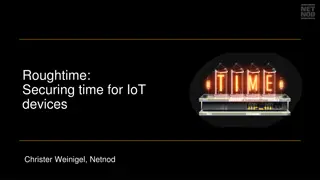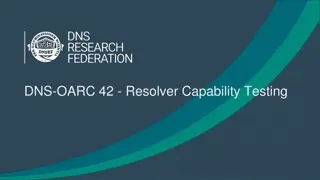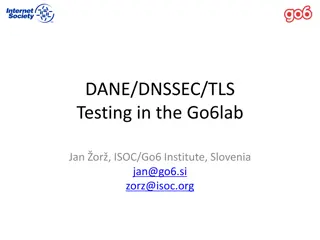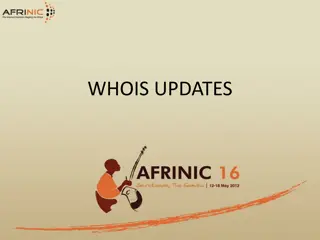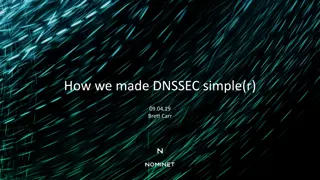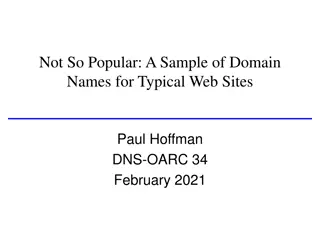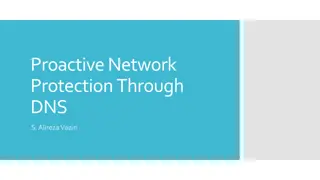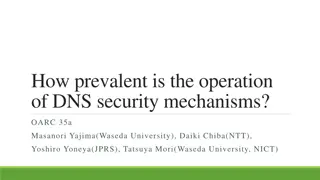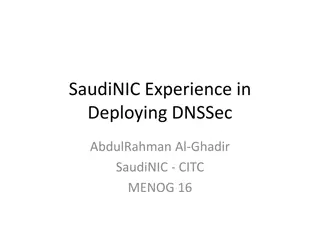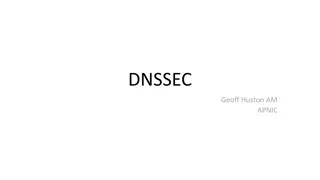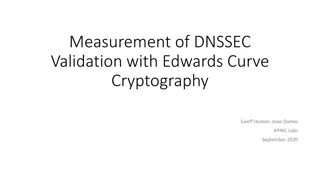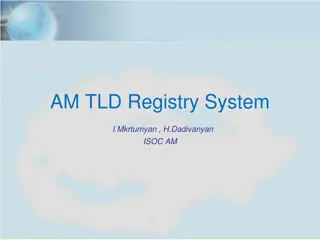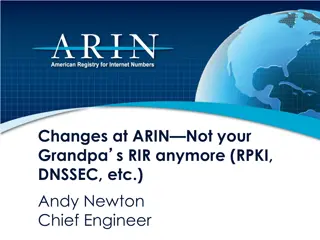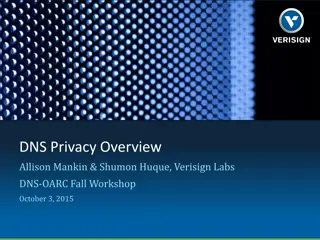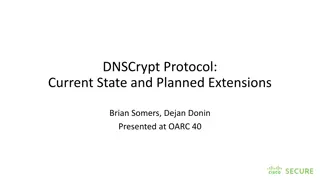
DNSSEC Protocol Parser Case Study by Fatema Bannat Wala
"Explore the journey of a security engineer at the University of Delaware delving into DNSSEC protocol analysis, Zeek IDS utilization, and code contributions. Discover the motivation, goals, and insights shared in this insightful presentation."
Uploaded on | 0 Views
Download Presentation

Please find below an Image/Link to download the presentation.
The content on the website is provided AS IS for your information and personal use only. It may not be sold, licensed, or shared on other websites without obtaining consent from the author. If you encounter any issues during the download, it is possible that the publisher has removed the file from their server.
You are allowed to download the files provided on this website for personal or commercial use, subject to the condition that they are used lawfully. All files are the property of their respective owners.
The content on the website is provided AS IS for your information and personal use only. It may not be sold, licensed, or shared on other websites without obtaining consent from the author.
E N D
Presentation Transcript
DNSSEC Protocol Parser: A case study Fatema Bannat Wala Security Engineer University of Delaware Fatema.bannatwala@gmail.com
About Me A big fan of Zeek IDS Have been working with Zeek for past 4 years Joined UD s IT Security Operations(IT-SecOps Team) in 2015 Passionate about Cyber-Security Also a part-time Ph.D. student
Agenda Goal of this talk Motivation - How it all started? Why DNSSEC Protocol parser? Getting started Deep dive into code The top-down approach! Summary
UDs Traffic Profile Multiple 10 Gbps network links Average speed ~5Gbps on each link Peak speed ~8Gbps on each link 4 Zeek sensors, each getting 25% of total traffic Each sensor getting average 300Kpps with peak ~ 900Kpps
Goal of this talk Deep dive into analysis of one of the types of weird that resulted in a small contribution in Zeek DNS protocol analyzer DNSSEC RR types parsing support To share the thought process and steps taken to code the parser To show that a bit of code re-use and smart techniques can be enough to get familiar with Zeek world! And to encourage people to contribute to the open source Zeek project.
Motivation How it All Started? Weird logs analysis Almost ~200 unique weird notices in weird.log Investigating the condition triggering the weird notices logging But where to find them? In core layer - source code of Zeek IDS (in .cc files) In script land - in base/ policy/ folders (in various .zeek scripts )
Motivation How it All Started? The noisiest one was DNS_RR_unknown_type $ zcat weird.*.log.gz | awk -F'\t' '{print $7}' | sort | uniq -c | sort -rn 2,603,914 DNS_RR_unknown_type 2,160,812 possible_split_routing 2,092,811 inappropriate_FIN Ok, so what DNS RR types are unknown to Zeek? $ zcat weird.*.log.gz | grep DNS_RR_unknown | awk -F'\t' '{print $7,$8}' | sort | uniq - c | sort -rn 1,049,729 DNS_RR_unknown_type 46 234,393 DNS_RR_unknown_type 50 99,914 DNS_RR_unknown_type 43 44,346 DNS_RR_unknown_type 47 26,592 DNS_RR_unknown_type 48
Analysis - Why DNSSEC Protocol parser? After looking up those RR numbers, looks like they belong to DNSSEC protocol types: RR Type ID RR Type Name Description 46 RRSIG Resource Record Signature 50 43 NSEC3 DS Next Secure Record v3 Delegation Signer 47 NSEC Next Secure Record 48 DNSKEY Public Key of the key pair used for Signing RRSIG Records
Getting started Step by Step! Find the condition that triggers the weird notice DNS_RR_unknown_type In Script Land [user@sensor ~]$ grep -rnw '/usr/local/bro/default/share -e 'DNS_RR_unknown_type /usr/local/bro/default/share/bro/base/frameworks/notice/weird.bro:122: ["DNS_RR_unknown_type"] = ACTION_LOG, .. ## A table specifying default/recommended ##actions per weird type. . controls logging of different weirds.. const actions: table[string] of Action = { ["DNS_RR_bad_length"] = ACTION_LOG, ["DNS_RR_length_mismatch"] = ACTION_LOG, ["DNS_RR_unknown_type"] = ACTION_LOG, } &default=ACTION_LOG &redef; .. Triggering condition not there.. hmm
Getting started Step by Step! Find the condition that triggers the weird notice DNS_RR_unknown_type In Core Layer (Source Code) [user@sensor bro-2.6.1]$ grep -rnw src/ -e 'DNS_RR_unknown_type src/analyzer/protocol/dns/DNS.cc:326: analyzer->Weird("DNS_RR_unknown_type", fmt("%d", msg->atype)); Looks like DNS.cc defines the condition that triggers Weird notice for DNS_RR_unknown_type weird type.
Getting started So Far What we know so far: DNS_RR_unknown_type is the noisiest weird we are trying to investigate. It isn t defined in Script land It is defined in the source code, specifically in file DNS.cc Some Tips for deep dive into the code.. A good text/code editor - Sublime is a great text editor tool to effectively navigate between the code files. Use the tool you are comfortable with! Need the source code of Zeek, so if not build from source, get the source code from the website/Github.
Deep Dive into the Code Let s take a look at DNS.cc - the condition that triggers DNS_RR_unknown_type
Deep Dive into the Code Let s take a look at DNS.h
Top Down Approach So there are MANY RR Types parsers already written in DNS.cc Analysis: Can extend the code to include the parsing of unknown RR types corresponding to DNSSEC Find if there is a parsed RR type closest to any of the DNSSEC types? After quick look at the DNS.h RR_Type enum & corresponding DNS.cc:
Top Down Approach I chose to follow TYPE_TSIG. Analysis: Let s start from DNS.cc main code file Function call that parses TSIG RR Function that parses TSIG RR New Record Type dns_tsig_additional for TSIG RR New Conn Event dns_TSIG_addl for TSIG RR
Top Down Approach - Analysis So Far: From DNS.cc - We chose already parsed DNS RR Type TYPE_TSIG We found the function that parses the TSIG RR ParseRR_TSIG A new connection event used for TSIG RR dns_TSIG_addl A New Record Type used for TSIG RR dns_tsig_additional Unknown - What other code files would need to be modified? Where is the new Event declared and handled? Where is the new Record Type declared/defined and what/how many values it has?
Top Down Approach - Finding the Unknown: Lets do a quick search on dns_tsig in the src code:
Top Down Approach - Summary We chose TYPE_TSIG as a reference to code DNSSEC RR TYPES Dry Analysis of the code showed following files would need extensions: src/analyzer/protocol/dns/DNS.h -> New Type/function declarations src/analyzer/protocol/dns/DNS.cc -> New Parser code src/NetVar.h & src/NetVar.cc -> New Internal Type declaration/definition scripts/base/init-bare.bro -> New Record Type definition src/analyzer/protocol/dns/events.bif -> New event declaration scripts/base/protocols/dns/main.bro -> Handles the event
DNSSEC New Events / Record Types RRSIG Event dns_RRSIG (c: connection, msg: dns_msg, ans: dns_answer, rrsig: dns_rrsig_rr) DNSKEY Event dns_DNSKEY (c: connection, msg: dns_msg, ans: dns_answer, dnskey: dns_dnskey_rr) DS Event dns_DS (c: connection, msg: dns_msg, ans: dns_answer, ds: dns_ds_rr) NSEC3 Event dns_NSEC3 (c: connection, msg: dns_msg, ans: dns_answer, nsec3: dns_nsec3_rr) NSEC Event dns_NSEC(c: connection, msg: dns_msg, ans: dns_answer, next_name: string, bitmaps: string_vec)
Available in Zeek 3.0! Before Zeek < 3.0 dns.log After Zeek 3.0 dns.log
Top Down Approach - Summary Coding new RR types parsing ( RRSIG, NSEC, NSEC3, DNSKEY, DS) support: Captured the sample traffic using tcpdump Analyzed the packets captured in Wireshark Read and understand the RFCs for the Protocols & standard packet structure Code re-use -> no need to reinvent the wheel All the basic functions to extract the bytes from the packet are already available in code Start from something simple- code -> test -> troubleshoot -> repeat
Finally. Few Take Away If you see something, do something! Contribute back to the Zeek open source project It s fun to learn more about the most widely* used NSM in the industry You don t have to be Pro in coding smart techniques of code reference and code re-use will get you long way! & more importantly you will develop a new skill set to show off! (You might become one of few who speak hex!)
Acknowledgements Thanks to the Awesome Zeek Team for the support, and providing answers/solutions to all the Zeek related questions. [@zeek.org mailing list] Thanks for the opportunity to be a part of first Zeek Week 2019 !!

